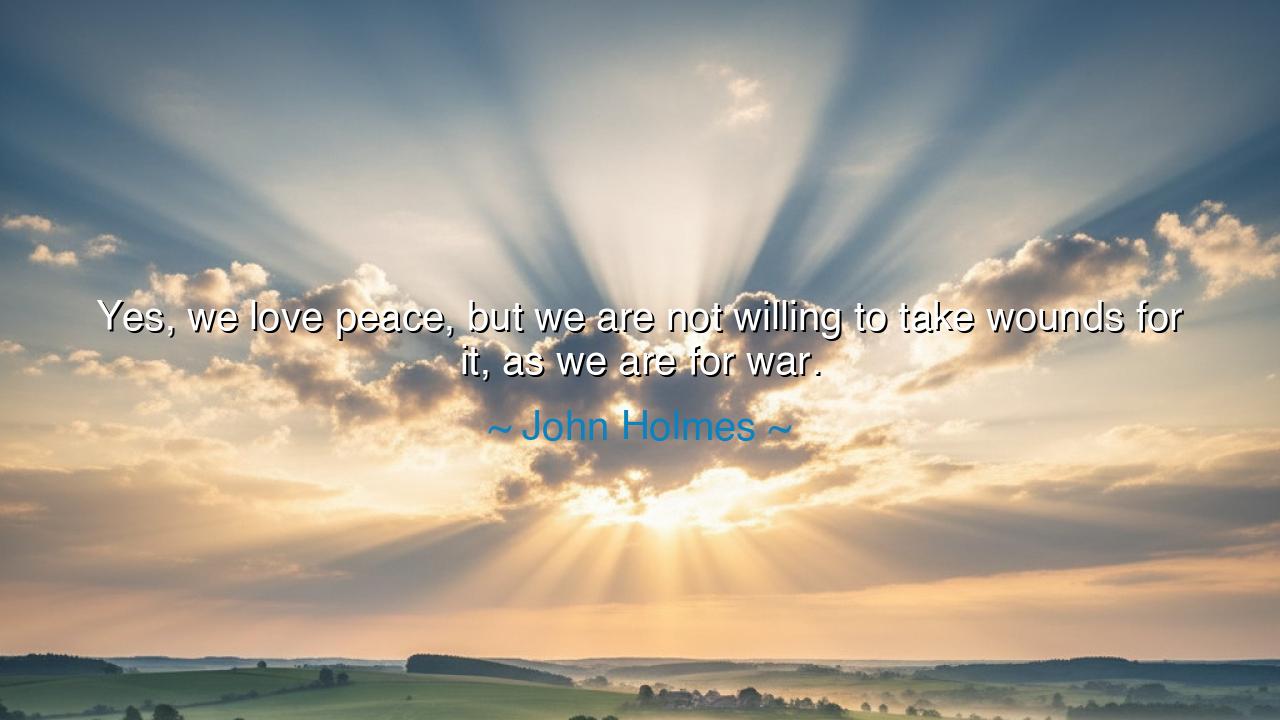
Yes, we love peace, but we are not willing to take wounds for






“Yes, we love peace, but we are not willing to take wounds for it, as we are for war.” Thus spoke John Holmes, and his words pierce with the force of lament and warning. For they uncover a truth about the human heart: that while men speak sweetly of peace, they often cherish it only in word, not in deed. They will march into battle, bleed upon fields, and suffer wounds for the sake of conquest or defense; yet when peace demands sacrifice, endurance, and courage of another kind, many turn away. Holmes unmasks the contradiction at the center of humanity’s longing.
When he says we love peace, he acknowledges the universal yearning of the soul. No man desires endless strife; all long for the quiet of safety, for families untouched by destruction, for harvests unburned by fire. But Holmes continues: though we profess this love, we do not labor for it with the same vigor with which we wage war. For war demands swords, and men lift them. Peace demands patience, forgiveness, compromise, and the laying down of pride—and here, too many falter. Thus his words strike at the heart of hypocrisy: we admire peace from afar, but refuse to bear its wounds up close.
History gives grim testimony to his truth. Consider the years before the Second World War, when nations trembled at the growing threat of fascism. Leaders spoke of peace, yet few were willing to risk wounds—diplomatic, political, or military—in order to preserve it. They sacrificed principle for comfort, delaying confrontation until war engulfed the earth in fire. The world saw that men were quick to shed blood once war began, but slow to endure the struggles that might have secured peace before the storm.
And yet, history also offers luminous counterexamples. Recall Martin Luther King Jr., who bore the blows of hatred, imprisonment, and insult for the cause of nonviolent peace. He chose to take wounds not in war, but in peace, showing that the path of reconciliation is not passive, but courageous. Or think of Mahatma Gandhi, who endured violence without striking back, teaching that peace requires its own kind of battlefield, where the weapons are patience and love. These were warriors of peace, willing to suffer so that others might one day walk without fear.
Holmes’ words remind us that peace is costly. It is not won by mere speeches, nor by idle wishes. It demands sacrifice: the sacrifice of pride, the sacrifice of vengeance, the sacrifice of comfort. To forgive when wronged is a wound. To reconcile with one who has been an enemy is a wound. To resist violence with nonviolence is a wound. Yet only through such wounds can peace be born. Without them, war always returns, stronger than before.
The lesson is clear: if you truly love peace, be willing to suffer for it. Do not imagine peace is weakness; it is the higher courage. Just as the soldier accepts the wounds of battle, so must the peacemaker accept the wounds of patience and endurance. Both shed blood, but one preserves life while the other destroys it. Ask yourself: are you willing to pay the price peace requires? Or do you love it only in words, as Holmes warns?
Practical wisdom flows from this teaching. In your own life, choose to labor for peace actively. In family quarrels, be the first to forgive. In communities divided, be the one to listen, even when it is painful. In a world quick to fight, be the one who endures hardship to prevent needless destruction. These are not easy tasks—they are wounds. But in them lies the true proof of your love for peace.
Thus let John Holmes’ words resound through the ages: “We love peace, but we are not willing to take wounds for it, as we are for war.” Let them be a mirror, showing us where we fall short, and a call, summoning us to a nobler path. For the highest victory is not the conquest of enemies, but the conquest of hatred itself. And that victory belongs not to the warrior who sheds blood in war, but to the one who bears wounds in peace.






AAdministratorAdministrator
Welcome, honored guests. Please leave a comment, we will respond soon